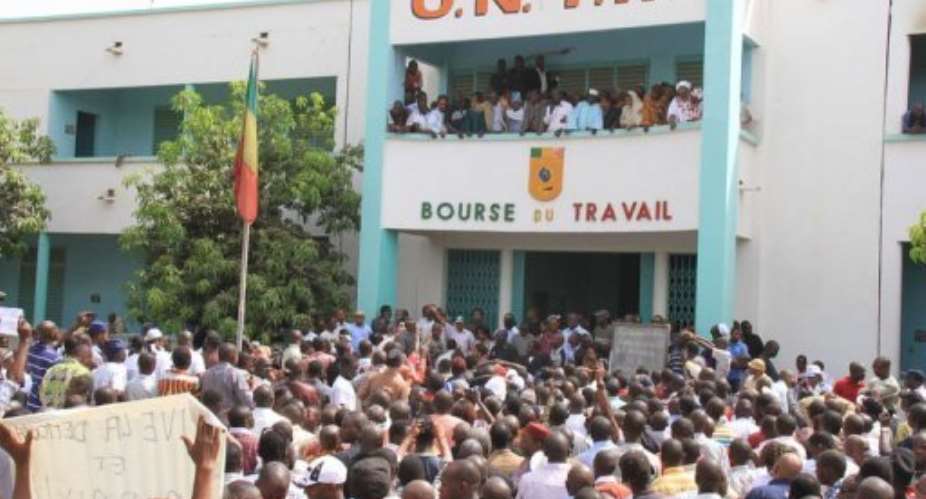BAMAKO (AFP) - Mali's junta faced mounting domestic and international pressure Monday as the US froze aid and the country's political class protested the overthrow of the democratically elected government.
Tuareg rebels in the vast north of the country sought to capitalise on the disarray and pushed on with their fight for independence of what they say is their traditional homeland.
The United States is a key ally to Mali and has helped it train soldiers to fight growing drug-trafficking and extremism. It joined Europe, Canada and other countries in suspending aid to the west African nation.
US State Department spokeswoman Victoria Nuland said aid would be frozen "pending a resolution of the situation on the ground."
The United Nations Security Council joined the chorus of rebuke against the renegade soldiers who overthrew President Amadou Toumani Toure on March 22, demanding the officers "return to their barracks."
Patience was also wearing thin in Mali, as a united front of political parties and organisations called a protest rally in front of the Bamako stock exchange.
"We demand a return to constitutional order," and "Down with the putschists, long live democracy, long live Mali," read banners held up by the protesters who began their rally by singing the national anthem, some raising their fists.
The demonstration fell on a national holiday celebrating the country's previous coup of March 26, 1991, when Toure led a band of soldiers to overthrow the 23-year-old dictatorship of Moussa Traore.
Having led the country to its first democratic polls a year later, Toure was considered a hero and later democratically elected in 2002. He was due to step down after serving two terms, following elections scheduled for April 29.
Toure's whereabouts are unknown, however the junta has assured he is safe and in good health, without saying whether he has been detained.
Life returned to normal in the capital Bamako, where shops re-opened and people ventured out after several tense days following the mutiny which has suspended all political processes.
The junta announced a partial re-opening of the country's borders, mostly to allow the transport of basic goods into the country, in a bid to restore order. They have also urged all civil servants and private employees to return to their jobs on Tuesday.
Tunisia's secretary of state Abadallah Triki was evacuated from the country along with 61 other citizens from France, Egypt, Libya, Morocco and Senegal, according to the Tunisian government and TAP airline.
Fourteen members of government, including the prime minister and foreign minister, launched a hunger strike on Sunday at the military barracks where they are being detained in a small room, forced to sleep three to a mattress.
The International Crisis Group on Monday urged the international community to act quickly, describing military rule as "a disaster for Mali and for all West Africa."
The think-tank said the coup was a "dramatic regression" for one of the region's advanced democracies.
"Without swift action, those gains will be impossible to win back for years to come," the Brussels-based organisation said, adding that looting carried out by renegade soldiers did not bode well.
The group also warned that key cities, including fabled Timbuktu, were at risk of falling to Tuareg in their drive for independence in northern Mali, which has seen more than 200,000 flee fighting since mid-January.
The Tuareg on Monday said the fall of the key town Kidal was "imminent", as they pushed on with their fight for independence.
The junta has claimed its coup was sparked by the regime's perceived weakness in the face of the Tuareg rebellion.
Their last uprising was resolved in 2009, however many Tuareg rebels had gone to fight for Libya's slain dictator Moamer Kadhafi and returned to the region heavily-armed and battle-hardened after his demise last year.
Their lightning strikes on several northern towns have overwhelmed a relatively weak, ill-equipped army.
The junta has suggested peace talks, but to no immediate avail.
On Sunday, the army said it had repelled an attack in Kidal, 1,000 kilometres (620 miles) from Bamako.





 We’ll protect state wealth from opaque deals – Prof Jane Naana
We’ll protect state wealth from opaque deals – Prof Jane Naana
 Mauritania president says running for second term in June polls
Mauritania president says running for second term in June polls
 I won't ever say I was a mere driver’s mate' — Prof. Opoku-Agyemang
I won't ever say I was a mere driver’s mate' — Prof. Opoku-Agyemang
 2024 polls: 'EC struggling to defend credibility'— Prof. Opoku-Agyemang
2024 polls: 'EC struggling to defend credibility'— Prof. Opoku-Agyemang
 Akufo-Addo gov't's 'greed, unbridled arrogance, unrestrained impunity, sheer dis...
Akufo-Addo gov't's 'greed, unbridled arrogance, unrestrained impunity, sheer dis...
 Election 2024: Ghana needs an urgent reset, a leadership that is inspiring – Ma...
Election 2024: Ghana needs an urgent reset, a leadership that is inspiring – Ma...
 Partner NDC to rollout a future of limitless prospects – Prof Jane Naana Opoku-A...
Partner NDC to rollout a future of limitless prospects – Prof Jane Naana Opoku-A...
 NPP will remain in gov’t till Jesus comes — Diana Asamoah
NPP will remain in gov’t till Jesus comes — Diana Asamoah
 Sunyani Technical University demands apology from former SRC president over sex-...
Sunyani Technical University demands apology from former SRC president over sex-...
 'Dumsor' was resolved by Mahama but ‘incompetent' Akufo-Addo has destroyed the g...
'Dumsor' was resolved by Mahama but ‘incompetent' Akufo-Addo has destroyed the g...
